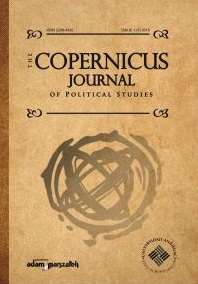The Limits of Rationalist Explanations for the Development of International Security Institutions
DOI:
https://doi.org/10.12775/18249Słowa kluczowe
rationalism, international security, international institutionsAbstrakt
In this article I argue that rationalist explanations which aspire to demonstrate why international security institutions develop, do not qualify as fully satisfactory arguments. Their limits become apparent particularly if one attempts to account on their basis for the diversity of types of institutions such as balance of power, collective security, hegemony, etc.
The initial step in my analysis was to address the limitations of the three arguments which I referred to as materialist, functionalist, and evolutionist that individually make up either whole rationalist conceptions on the development of international security institutions or parts of them. Having done so, I also examined the possibilities to combine these arguments to explore whether the effort yields any extra explanatory power.
The main reasons for why these explanations and their combinations fail to convincingly account for the diversity of international security institutions are threefold. First, the functionalist, evolutionist, and the functionalist-evolutionist arguments do not attempt to address the issue directly and provide only a general assertion on the factors influencing the formation of institutions instead of tackling the problem with respect to their particular types. Second, the materialist argument advances a logic of state action that justifies the creation of certain types of institutions and, at the same time, rules out the development of others. Third, it proves also incompatible with the other two arguments. The implication of this is that states would have to choose between mutually exclusive logics of action and, thus, behave in a way for which none of the arguments provides any explanation.
Full text: http://bazhum.muzhp.pl/czasopismo/589/?idno=14760
Bibliografia
Axelrod R., The Evolution of Cooperation, New York 1984.
Bull H., The Anarchical Society. A Study of Order in World Politics, New York–Chichester 2002.
Clark I., Towards an English School Theory of Hegemony, “European Journal of International Relations” 2009, No. 2, Vol. 15.
Dowty A., Conflict in War Potential Politics: An Approach to Historical Macroanalysis, “Peace Research Society (International) Papers” 1969, Vol. 13.
Drgas M., The Role of State Identity in the Development of International Security Structures: the Case of Post-Cold War Latin America [in:] Polityczne problemy Ameryki Łacińskiej [Political Problems of Latin America], J. Knopek (ed.), Toruń 2012.
Haas E. B., The Balance of Power: Prescription, Concept, or Propaganda, “World Politics” 1953, No. 4, Vol. 5.
Jervis R., From Balance to Concert: A Study of International Security Cooperation, “World Politics” 1985, No. 1, Vol. 38.
Keohane R.O., After Hegemony. Cooperation and Discord in the World Political Economy, Princeton 1984.
Keohane R.O., Neoliberal Institutionalism: A Perspective on World Politics [in:] International Institutions and State Power. Essays in International Relations Theory, R.O. Keohane (ed.), Boulder 1989.
Kupchan Ch.A., Kupchan C.A., The Promise of Collective Security, “International Security” 1995, No. 1, Vol. 20.
Lake D.A., Beyond Anarchy: The Importance of Security Institutions, “International Security” 2001, No. 1, Vol. 26.
Mingst K., Essentials of International Relations, New York–London 2003.
Modelski G., Is World Politics Evolutionary Learning?, “International Organization” 1990, No. 1, Vol. 44.
Morgenthau H.J., Scientific Man vs. Power Politics, London 1947.
Nye Jr. J.S., Understanding International Conflicts. An Introduction to Theory and History, New York–San Francisco–Boston–London–Toronto–Sydney–Tokyo–Singapore–Madrid–Mexico City–Munich–Paris–Cape Town–Hong Kong–Montreal 2007.
Simon H.A., A Behavioral Model of Rational Choice, “Quarterly Journal of Economics” 1955, No. 1, Vol. 69.
Snidal D., The Game Theory of International Politics, “World Politics” 1985, No. 1, Vol. 38.
Snyder G.H., Diesing P., Conflict among Nations: Bargaining, Decision Making, and System Structure in International Crises, Princeton 1977.
Stein A., Coordination and Collaboration: Regimes in an Anarchic World [in:] International Regimes, S.D. Krasner (ed.), Ithaca–London 1983.
Wæver O., The Rise and Fall of the Inter-Paradigm Debate [in:] International Theory: Positivism and Beyond, S. Smith, K. Booth, M. Zalewski (eds.), Cambridge–New York.
Waltz K.N., Theory of International Politics, Reading 1979, New York 1954.
Watson A., European International Society and its Expansion [in:] The Expansion of International Society, H. Bull, A. Watson (eds.), Oxford 1984.
Wendt A., Anarchy is what States Make of it: The Social Construction of Power Politics, “International Organization” 1992, No. 2, Vol. 46.
Wendt A., Social Theory of International Politics, Cambridge–New York–Melbourne 1999.
Opublikowane
Jak cytować
Numer
Dział
Statystyki
Liczba wyświetleń i pobrań: 0
Liczba cytowań: 0



